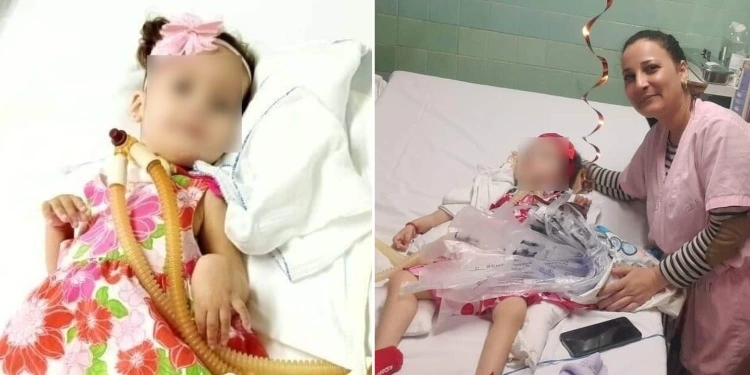SAN LUIS POTOSÍ, Mexico.- A little girl A Cuban woman who spent a year and a half hospitalized in San Cristóbal, Artemisa, because she did not have housing with the necessary conditions to cope with her illness, died this Tuesday, according to reports on social media from groups and Internet users who followed her case.
Three-year-old Karolina had spinal cord atrophy and was living connected to a ventilator at the San Cristóbal Hospital in the Artemisa province.
The news The news of her death was initially broadcast on the Facebook group “Blessed to Bless,” where they left a heartfelt message: “Today, sadly, one of our warriors lost the battle, Karolina, a very dear girl to all, little angel, today you left us and our hearts are broken.”
Likewise, the Internet user Yoselis Lugo, who made the case visible last year, described the day of her death as a “very sad” one and said: “A girl who touched my heart and everyone’s heart very much, left this world unexpectedly. Yesterday your mom showed me a photo of you with your happy face and today I have this bad news.”
Her case became public last year after it became known that the girl and her 27-year-old mother did not have a house nor the air conditioning and equipment required to keep the little girl alive.
“At this time she is hospitalized in the San Cristóbal Hospital in the Province of Artemisa, since despite being in that situation, she does not have a home to live in,” stated Last year the group Blessed to Bless.
After her situation went viral, thousands of supportive Cubans managed to raise around $5,000 in less than a month and bought the girl and her mother a house with the ideal conditions for her care. In this way, they solved a case that the authorities never addressed.
There are many cases of Cuban mothers and fathers who cry out for help on social media. In the midst of a health crisis that affects children in particular, they live with the anguish of not seeing their children improve due to the lack of resources and medicines in the country.
This year, Sarahí Martínez Palacio, a mother 38-year-old woman who lives in Antilla, Holguín, asked for help for her son, who suffers from Lennox Syndrome and is in critical condition.
In an interview with CubaNetthe mother revealed that the condition of Lázaro Miguel Belén is critical. He has a tracheotomy He is unable to control his sphincter and is severely mentally retarded. The mother, who lives in precarious conditions, appealed to the good will of Cubans to obtain medicines and any kind of help for her 19-year-old son.
Lennox syndrome, a severe and very rare type of epilepsy, can cause different types of seizures, some degree of intellectual disability and developmental delay.
To control a little the disease She relies on sodium valproate, lamotrigine and clonazepam, which are not stable in the pharmacy when they come in. She has only been able to buy some of them in limited quantities and they have lasted only a month.
Thanks to making her case visible on social media, she has managed to receive some help with the medications she would otherwise not have.
Although the authorities have promised it to him, it does not exist in pharmacies and he has no place to obtain it.
















